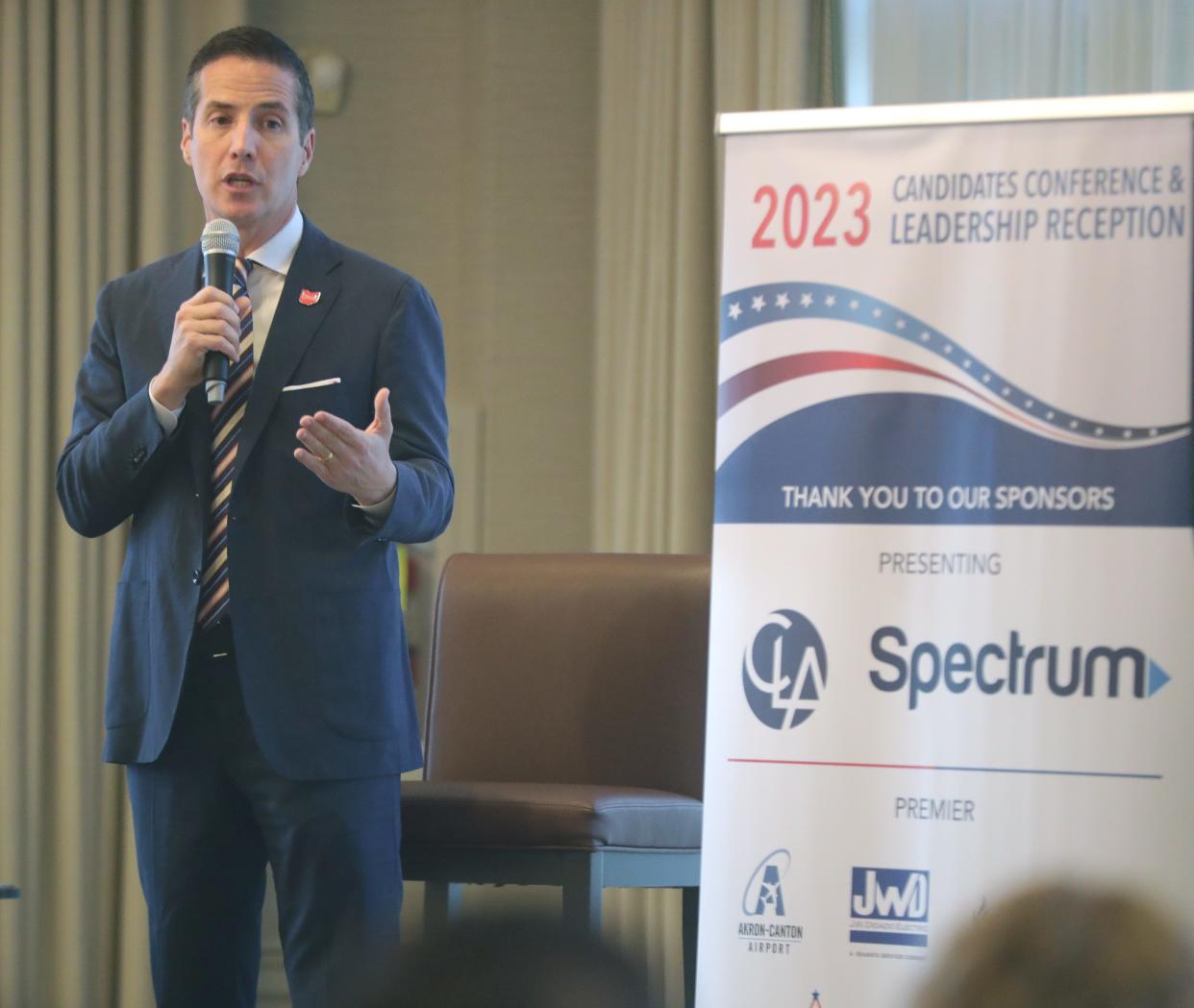Senate hopeful Bernie Moreno dismisses the core of legislating | Michael Douglas

Bernie Moreno not too long ago revealed something about the kind of lawmaker he would be if he reaches the U.S. Senate. The wealthy Cleveland businessman is seeking the Republican nomination in the March 19 primary. He has the backing of Donald Trump, no small help in a deepening red state party.
The insight came in October during an event sponsored by the Greater Akron Chamber. Moreno appeared with the two other Republican candidates, Frank LaRose, the Ohio secretary of state, and state Sen. Matt Dolan, the chairman of the Senate Finance Committee.
As reported in the Beacon Journal, one question went to how each viewed himself working across the aisle, in other words, bridging differences, essential to the work — if anything significant is going to get done.

Dolan touted his record of bipartisan achievement. LaRose spoke vaguely about exchanging ideas.
Moreno rejected the premise of the question.
He told the forum: “I’m actually going to Washington, D.C., to do the things that I just said I was going to do.” Those things include work requirements for social safety net programs, schools “freed from federal mandates” and “eliminating illegal immigration, getting rid of people who are here illegally.”
At one point, Moreno carped about the many in the nation’s capital who are “completely and utterly dysfunctional.” Yet, look closely, and dysfunction resides in the approach Moreno outlined for himself.
Reject the concept of working with the other side, especially with narrow majorities in the House and Senate, and you dismiss the core of legislating. In essence, Congress becomes a tiresome debating society, a place for rank performance, rather than an institution dedicated to governing, or serving the public interest.
Do we need another lawmaker with so skewed an outlook? Ohio already exchanged the effective Rob Portman for partisan warrior J.D. Vance.
Consider the current tug-of-war over border security and assistance for Israel and Ukraine. Majorities exist for all three items. Yet Congress appears at a loss in finding a way for those majorities to carry the day.
This tussle goes back to the Republican demand, or “hostage-taking,” declaring that aid to Ukraine in its battle against Russian aggression must be linked to improvements in border security. No question, the country has a problem at the border. A surge in migrants seeking asylum has overwhelmed the system.
In December, the numbers reached around 10,000 per day, compared to less than 50,000 annually four years ago.
The Biden White House earlier signaled its wish to join Congress in taking action. Finally, bipartisan negotiations began, notably, in the Senate, the details of the proposed legislation emerging last week.
This package reflects a genuine compromise. Worth emphasizing is how far the president has moved. Past efforts at addressing illegal immigration have involved the worthy combination of improved border security and a pathway to legal residency for millions of illegal immigrants long here. That pathway, a Democratic priority, isn’t part of the current deal.
Instead, the president and allies get aid to Ukraine, crucial in the moment for American leadership, not to mention the fate of Ukrainians who have been valiantly resisting the Russian invasion.
Are Republicans pleased? Some are, including U.S. Sen. James Lankford of Oklahoma, a lead player in the negotiations. The proposal closes loopholes in the asylum process. It limits parole for migrants and gives the president new authority to shut down the border when attempted crossings sharply increase.
The legislation also speeds the processing of asylum claims and otherwise supports a structure to match better the size of the problem. The conservative union for Border Patrol agents provided its endorsement.
Unfortunately, Donald Trump, Speaker Mike Johnson and other Republicans didn’t wait for the details before condemning the proposal. Johnson declared it “dead on arrival.” Trump called it “meaningless,” urging the speaker to insist on “a deal that is PERFECT ON THE BORDER.”
Perfect? Such an outcome hardly results when two sides seek to overcome big differences. The standard of success is improvement, ideally, pushing to the limit the art of the possible. By that measure, Republicans have won. What they should know is they won’t likely prevail even if they gain control of Congress and the White House. Democrats, demanding their own provisions, will deny them the necessary 60 votes in the Senate.
As the Bernie Moreno campaign indicates, Republicans think they have a winning issue in the troubles at the border. See the phony impeachment of Alejandro Mayorkas, the secretary of Homeland Security. Apparently, they would rather let the problem fester than make things better.
In doing so, they might weigh the risk of blame for the border, and Ukraine, falling on their shoulders. That easily can happen when you reject the premise of working across the aisle.
Michael Douglas was the Beacon Journal editorial page editor from 1999 to 2019. He can be reached at mddouglasmm@gmail.com.
Michael Douglas: Expansion of federal child tax credit would reduce poverty
Michael Douglas: J.D. Vance distinguishes himself as a partisan
This article originally appeared on Akron Beacon Journal: Senate hopeful Bernie Moreno dismisses the core of legislating
